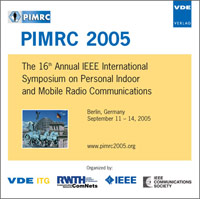Performance Analysis of Different Spreading Factors in Various Channel Conditions with Channel Estimation for Uplink WCDMA
Conference: PIMRC 2005 - 16th Annual IEEE International Symposium on Personal Indoor and Mobile Radio Communications
09/11/2005 - 09/14/2005 at Berlin, Germany
Proceedings: PIMRC 2005
Pages: 5Language: englishTyp: PDF
Personal VDE Members are entitled to a 10% discount on this title
Authors:
Reyaz, Tarannum; Burr, Alister (Department of Electronics, University of York, York, YO10 5DD, UK)
Abstract:
This paper investigates the performance of different spreading factors for uplink WCDMA in frequency selective channels. Comparison of perfect channel knowledge with estimated channel is performed and analysed. The performance is also analyzed for different Doppler frequencies corresponding to different speeds. A conventional Rake receiver was developed whose performance improved with an increase in diversity and when the paths that arrived were separated by one chip duration. To estimate the channel parameters, that are needed to correct the phase rotations and attenuations caused by the fading channel, a Wiener filter was employed which produced estimates in agreement with the actual channel parameters. The performance of various spreading codes were analysed which showed that codes with higher spreading gain performed better than those with lower gains due to the high cross correlation between shorter code lengths. High Intersymbol Interference (ISI) was experienced by signals with high data rates (low spreading factors) than signals with low data rates. Performance of BER of signals experiencing higher Doppler frequencies were high than those with low Doppler frequencies.


